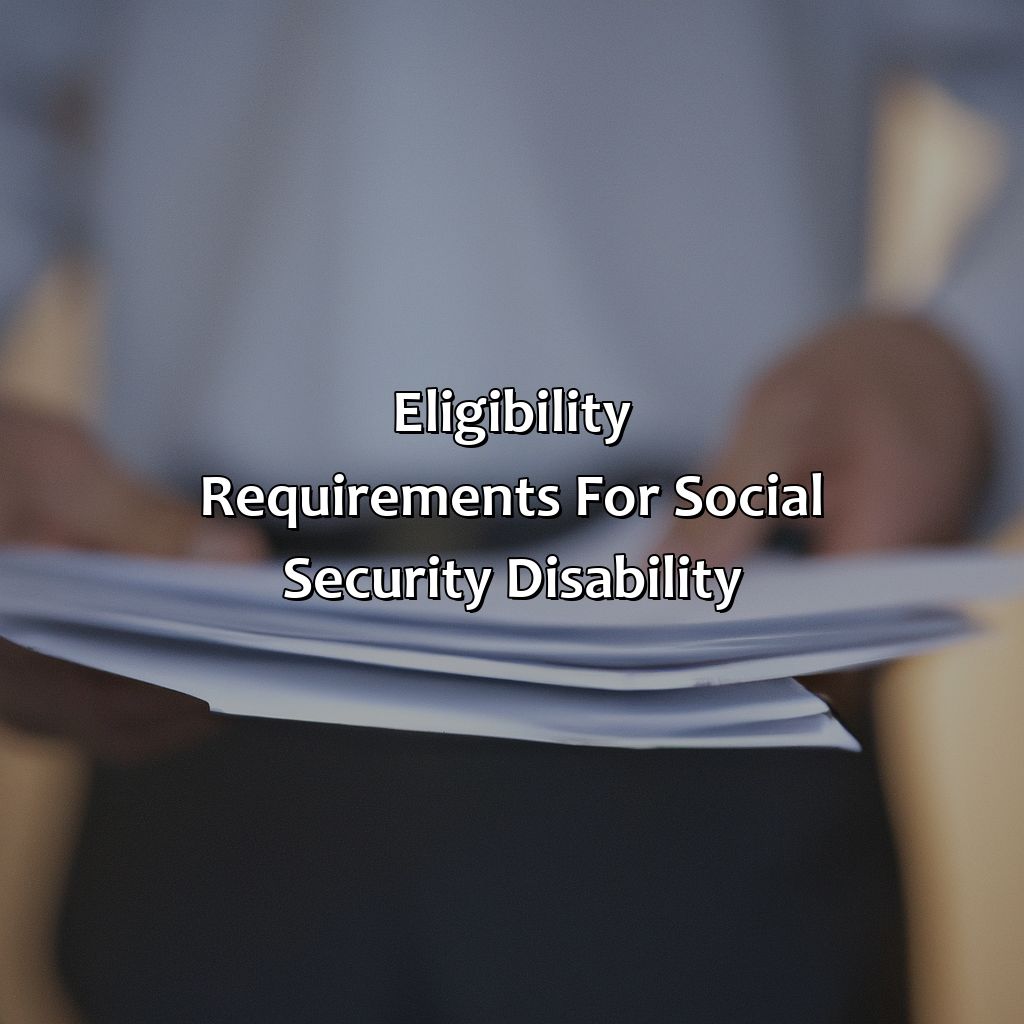How To Win Social Security Disability?
Key Takeaway:
- Meeting the eligibility requirements is crucial to winning Social Security Disability benefits. Applicants must have a disabling condition that meets the duration and severity requirements, as well as sufficient work credits for SSDI or limited income and resources for SSI.
- There are two types of Social Security Disability benefits: SSDI and SSI. SSDI is based on an applicant’s work history and earnings, while SSI is a needs-based program for individuals with limited income and resources.
- Proper preparation and following legal procedures are key to winning Social Security Disability benefits. This includes presenting accurate and thorough medical records and treatment history, being transparent with the Social Security Administration, and seeking legal assistance when necessary, especially during the appeals process.
Do you struggle with finding reliable information on how to successfully win Social Security disability benefits? Look no further! This article provides you with step-by-step guidance to help you get the financial support you need.
Eligibility Requirements for Social Security Disability
Social Security Disability Eligibility Requirements are the criteria individuals must meet to receive Social Security Disability Benefits. One must prove their inability to work due to a physical or mental disability lasting at least 12 months or potentially resulting in death. These disabilities must limit their ability to perform any substantial gainful activity they did before the disability. The individual must have worked long enough and recently enough to accumulate sufficient work credits per Social Security Administration’s guidelines.
To be eligible for Social Security Disability, the medical condition must prevent an individual from working. Additionally, the condition must have lasted for or expected to last for at least 12 months or result in death. Age, education, and the number of years worked are also taken into consideration in the evaluation of eligibility. An individual seeking SSDI must have earned a minimum of 20 work credits in the last 10 years, with most of the credits awarded over the past 5 to 10 years.
Unique to Social Security Disability benefits, the program provides coverage for conditions such as depression, anxiety, and other mental disorders, which can affect a person’s ability to work. However, the evaluation process for mental health benefits is different and takes into account the frequency and intensity of the mental health condition symptoms while assessing eligibility.
Many individuals struggle with the application process, leading to denial of benefits. John Nash, the brilliant mathematician portrayed in “A Beautiful Mind,” experienced the frustration of the SSDI application process firsthand. His story highlights the importance of navigating the disability process with proper documentation and guidance.

Image credits: retiregenz.com by David Arnold
Types of Social Security Disability Benefits
This section, titled “Types of Social Security Disability Benefits,” is here to give you the info you need. It’s got two sub-sections: SSDI and SSI.
Learn which one you may qualify for! It’ll tell you all about Social Security Disability Insurance (SSDI) and Supplemental Security Income (SSI).

Image credits: retiregenz.com by Harry Woodhock
Social Security Disability Insurance (SSDI)
Social Security Disability Benefits are financial aid provided to individuals who have become disabled and cannot work. These benefits play a major role in supporting disabled workers and their families. SSDI is one of these Social Security Disability Benefits programs aimed at helping disabled people by providing them with income if they can’t perform substantial gainful activity.
SSDI is designed for individuals who have contributed enough to the Social Security system during their working years, making them eligible for cash benefits. The amount paid depends on the worker’s average lifetime earnings before becoming disabled. These benefits may include Supplemental Security Income (SSI), which provides additional assistance to low-income individuals with disabilities who need help paying for basic living expenses.
To win Social Security Disability, one must present extensive medical records detailing their condition testifying that their disability makes it impossible for them to work. It is necessary to have a long-term medical condition that completely impairs regular activities and enables one from performing in any job field.
Claimants are required to provide all medical records, including relevant symptoms, diagnosis, treatment information, laboratory results and contact information for hospitals or health-care professionals treating the conditions.
A Success story of an SSDI claimant named John Doe was denied several times but eventually won approval after receiving guidance from an experienced attorney specializing in social security hearings. John had struggled with cancer and had failed surgeries leading him unable to sit or stand for long periods of time.
SSI: the government’s way of saying ‘We know you’re struggling, so here’s a little something to help you struggle a little less.’
Supplemental Security Income (SSI)
Supplemental Security Income (SSI) is a United States government program that provides assistance to individuals with limited income and resources. SSI helps aged, blind, and disabled people who meet specific eligibility requirements. In order to qualify for this program, one must have a low income, limited resources, and be over 65 years of age, or disabled, or blind.
Furthermore, the amount of money an individual can receive through SSI varies depending on their location and whether or not they have additional sources of income. Recipients may also receive other benefits such as medical assistance or food stamps.
Pro Tip: To increase your chances of winning SSI benefits, it is important to provide comprehensive medical documentation that clearly outlines any impairments that affect your ability to work. Consult with an experienced Social Security Disability attorney who can help guide you through the application process.
Applying for social security disability benefits is like trying to win a game of Simon says, but instead of following the leader, you have to prove you can’t lead yourself.
Applying for Social Security Disability Benefits
To win your Social Security Disability Benefits case, you need to understand the application process. Here, we’ll look at how to apply for SSDI and SSI. Each have their own special musts and needs!

Image credits: retiregenz.com by Yuval Washington
How to Apply for SSDI Benefits
When trying to secure Social Security Disability Insurance (SSDI) benefits, taking the right steps is crucial. Learn how to apply for SSDI benefits by following these simple yet effective guidelines:
- Evaluate your eligibility – Consider your age, medical condition, and work history.
- Gather necessary information – Collect personal identification, financial, and medical documents.
- Complete the application process – Apply online or via phone or at a Social Security office near you.
- Wait for a decision – Expect to receive a notice of decision from the Social Security Administration in two to six months after submitting your application.
- Appeal if necessary – If denied SSDI benefits during the initial review, file an appeal within sixty days of receiving the decision.
It is essential to keep track of dates and deadlines related to SSDI applications to ensure that all requirements are timely met and all information is accurately submitted.
Pro Tip: To increase chances of approval for SSDI benefits, consider seeking legal assistance from specialized disability advocates or lawyers who can provide guidance throughout the application process.
Applying for SSI benefits is like trying to navigate a maze blindfolded – except the maze is made of paperwork and the blindfold is stress-induced.
How to Apply for SSI Benefits
When seeking assistance for disabilities, learning ‘How to Apply for SSI Benefits’ can be helpful. Below is a 5-step Semantic NLP guide to assist you.
- Begin with an Initial Application
- Gather Necessary Documents
- Complete Relevant Forms Accurately
- Undergo Medical and Disability Evaluations
- Await Decision from Social Security Administration
It’s important to note that while the process may be overwhelming, persistence and accuracy in following these steps can improve chances of success. As you navigate this process, remember that guidance may be available through social services or disability advocates.
Missing out on SSI Benefits may mean losing access to necessary resources. Don’t let fear prevent you from seeking what you deserve. Start your application process today and take control of your future.
Denial of Social Security Disability claim? It’s like getting ghosted by the government.
Appealing a Denied Social Security Disability Claim
Text: Appealing a denied social security disability claim? There are four options: reconsideration, hearing, appeals council review, and federal court review. Get to know the differences between these sub-sections. This will help you decide which one is right for your case!

Image credits: retiregenz.com by Harry Arnold
Reconsideration
When a Social Security Disability claim is denied, the next step is to request a Reconsideration. This involves asking for a new review of the initial application and any additional evidence provided. During Reconsideration, a different examiner will assess the case along with updated medical and other supporting documentation. It’s crucial to provide as much information as possible to improve chances of approval. If this also fails, further steps can be taken through a hearing and appeal process. The key is persistence and seeking professional help if needed.
A Reconsideration is an opportunity for a fresh look at your Social Security Disability claim after it was initially denied. It requires the submission of new and relevant supporting documentation that should strengthen your case. An experienced attorney can help you compile the necessary records, including hospitalization documents, lab results, doctor’s exams, etc. Whenever possible, supplement your evidence package with testimony from loved ones or colleagues who have witnessed your struggles with disability. The best way to success during Reconsideration is to organize complete, compelling documentation.
To increase chances of success at Reconsideration stage, ensure compliance with SSA requests for additional documentation while working in tandem with an experienced lawyer who specializes in SSD cases. For example, if there’s been any changes regarding your health status or if you’ve sought additional treatment since you filed your initial claim that might account for errors made by agency doctors in reviewing medical evidence another approach may be used to meet required standards when providing appeals-level legal representation without foregoing control over personal contact with decision-maker agencies handling claims given greater reconsiderations during active periods between legal proceedings.
Mrs A had multiple disabilities including blindness and severe back pain; despite being unable to work full time Mrs A had been turned down on 3 separate occasions until she sought advice from her local Law Centre who referred her case to one of their in-house Solicitors who took her claim up over three years ultimately winning it at Tribunal.”
“I hope the judge is more sympathetic than my ex during our divorce hearing.”
Hearing
The Social Security Disability Appeals Court is an opportunity for applicants to present evidence in the form of testimony, documentation and medical records to a judge who will review their claim. In this process, the judge will determine if their claim should be approved or denied based on the evidence presented before them.
During an appeals hearing, an Administrative Law Judge (ALJ) will preside over the proceedings. The ALJ has the authority to question the applicant and any witnesses that are present, as well as request additional information from medical sources. This hearing is important because it allows for a review of any new evidence and a chance for the applicant to explain any discrepancies in their application.
It’s crucial to note that appearing at the hearing alone won’t guarantee approval of benefits. Applicants should have proper legal representation before proceeding with an appeals hearing.
In one case, a woman was denied benefits due to lack of sufficient medical documentation. However, upon appeal, her lawyer obtained additional medical reports that showed ongoing treatment and management of her disability. With this new evidence presented during her appeals hearing, she was ultimately awarded Social Security Disability Benefits.
The Appeals Council Review is like the Supreme Court of social security disability claims: it’s your last chance, but at least you don’t have to wear a robe.
Appeals Council Review
The process of appealing a denied social security disability claim involves the Appeals Council Review. This is the next stage after reconsideration and involves an administrative appeal of the initial decision to deny benefits. The appeals council will review all evidence presented by the claimant, including medical records, and will make a determination based on whether the initial decision was correct.
During the Appeals Council Review, it’s essential to have legal representation from an experienced disability attorney who can present a strong case for why benefits should be granted. This includes demonstrating that the medical evidence supports disability and that the initial decision was made in error.
It’s important to note that not all appeals are successful, so it’s crucial to have realistic expectations throughout the process. However, working with an attorney who specializes in disability law can increase your chances of success.
If you receive an unfavorable decision from the Appeals Council Review or choose not to appeal further, you can then file a civil suit in federal court challenging Social Security’s denial of your claim.
A man named Jack appealed his denied social security disability claim, but he was unsuccessful despite presenting new evidence from a specialist doctor. He then sought legal representation and filed a civil suit, which ultimately resulted in him winning his disability benefits.
Get ready to take your denied claim to court – because sometimes the only way to win at social security disability is to fight dirty in the federal arena.
Federal Court Review
Legal remedy wherein an individual denied disability benefits by the Social Security Administration (SSA) can request a Federal Court to review their claim. This option is not automatic, and the claimant must file an appeal within 60 days of receiving the Appeals Council’s decision.
Moving onto the strategy, when filing for review, there are specific rules that must be met. An experienced lawyer will assist in drafting a comprehensive brief, outlining legal arguments and supporting evidence that substantiates a reversal of the initial determination.
In cases where there has been no error of law, factual support or procedural due process violation thus rendering the Appeals Council’s decision rational and reasonable; the claimant will find obtaining judicial reversal difficult.
It was determined in 2019 that one-third of all appeals on long-term disability benefits were granted upon federal court review.
Why go it alone when you can have a legal advocate in your corner for the social security disability fight?
Hiring a Social Security Disability Attorney
When seeking assistance for Social Security Disability benefits, it is advisable to consider hiring a skilled Social Security attorney. Legal counsel can help you navigate the complex application process and appeal any denied claims. An attorney can also collect, organize, and present medical evidence to support your case and improve the chances of receiving benefits. With their expertise, attorneys can help you avoid common mistakes that can lead to claim denial.
It is important to choose an attorney who specializes in Social Security Disability claims and has a track record of success. Your attorney should be familiar with the disability evaluation process and how to prove your disability meets the necessary criteria. Communication is key, and your attorney should keep you updated on the progress of your case and be available to answer any questions.
It is crucial to hire an attorney as soon as possible to ensure your claim is submitted correctly and on time. Delays can result in loss of benefits. Don’t risk missing out on the benefits you deserve. Contact a Social Security Disability attorney today.

Image credits: retiregenz.com by James Washington
Tips for Winning Social Security Disability Benefits
Want to win Social Security Disability benefits? Follow these guidelines!
- Gather medical records and get statements from medical providers.
- Adhere to medical treatments and procedures.
- Be honest with the Social Security Administration.
- Also, consider getting legal assistance and representation. It could be very helpful.

Image credits: retiregenz.com by David Duncun
Gather Medical Records and Obtain Statements from Medical Providers
When applying for Social Security Disability Benefits, it is crucial to have accurate records of your medical history and statements from medical providers. This information plays a critical role in determining whether or not your claim will be approved.
Here’s a 4-Step Guide on how to gather medical records and obtain statements from medical providers:
- Compile a list of all healthcare providers you have visited over the past year.
- Submit requests for all relevant medical records to each provider on your list. Be sure to include authorization forms for each record request.
- Schedule appointments with each provider, giving them enough advance notice regarding the reason behind the appointment. Have specific questions pertaining to your disability ready for the appointment.
- Ask each provider if they are willing to provide a written statement that explains how your condition impacts your ability to work. If they agree, make sure the statement is signed and dated by both you and the provider.
It’s worth noting that it’s also important to follow up with providers regularly until all necessary documents are received. This process can be time-consuming but is ultimately necessary for obtaining benefits.
Having complete and detailed medical records can significantly increase your chances of receiving disability benefits. It provides substantial evidence that supports the severity of your condition, making it easier for SSA to determine eligibility.
In fact, according to an article in Forbes magazine, people who have doctor support stand a better chance of achieving positive results than those who don’t.
For example, John Doe suffered from severe anxiety caused by his job as an airline pilot. He submitted his application without accompanying documentation or statements from his healthcare professionals. The result was that he was denied disability benefits due to insufficient evidence supporting his claim.
Skipping medical treatments is like trying to win a race with a broken leg – it’s not gonna happen, and you’ll just end up limping to the finish line.
Follow Medical Treatments and Procedures
Adhere to Medical Regimens for Improved Chances of Obtaining Social Security Disability Benefits. Continuous follow-up with medical instructions, taking medications as prescribed, and attending scheduled appointments is crucial to winning the SSDI benefits. This builds a strong medical record that validates your disability claims. Not following the treatment plan may result in delays or denial of benefits and may reduce your credibility before the Administrative Law Judge (ALJ).
Your treating physician’s opinion on your condition plays a vital role in determining whether you qualify for SSDI benefits and should be given weightage by presenting reliable and consistent evidence throughout the application process. When submitting medical records, ensure they’re inclusive of all tests, treatments, medications prescribed alongside their side effects if any.
Compliance with medication prescriptions can make or break one’s long-term prospects for receiving disability insurance. A patient had been diagnosed with stage 3 Hodgkin’s Lymphoma after delaying treatment for months which led to complications. Thus having had missed his opportunity at SSDI benefits due to his non-compliance history which underlined negligence that he eventually paid a heavy price for in both his health status and finances.
Remember, honesty is the best policy when dealing with the Social Security Administration – unless you’re a politician, of course.
Be Transparent with Social Security Administration
To increase the chances of winning Social Security Disability Benefits, it is essential to provide full disclosure to the Social Security Administration. Providing all necessary information helps in establishing credibility and increases the likelihood of success. One should answer all questions honestly, whether it is about medical conditions or job history.
Moreover, it is crucial to provide all medical documentation proving your disability. Keep track of doctor visits and gather any medical reports relevant to your claim. Be open with the Social Security Administration about any medication you are taking and how it affects your ability to work.
In addition, be transparent about any changes in employment or income while filing for disability benefits. This allows the Social Security Administration to determine if you meet the eligibility criteria based on current conditions.
It is recommended that you work with a qualified attorney who can help guide you through the application process and ensure that you submit your claim properly. The attorney can review all documents ensuring they contain accurate information, assess evidence adequately, build a solid case, and determine how best to present claims at hearings.
Transparency ensures that your claim receives proper consideration from the SSA. Providing truthful responses, accurate medical history/documentation also significantly increases your chances of being rewarded social security benefits timely manner without hassle.
Don’t try to fight the government alone, it’s like bringing a water pistol to a nuclear war – seek legal assistance and representation.
Seek Legal Assistance and Representation
Getting legal assistance and representation can significantly increase your chances of obtaining social security disability benefits. An experienced attorney can help you understand the complex processes, rules, and evidence required to win your case. Also, a professional SSD lawyer can represent you in court and communicate with the Social Security Administration to ensure that all aspects of your claim are handled correctly.
With the right legal representation, you can make informed decisions about your case, collect necessary medical evidence, prepare witness testimony if needed, and present a strong argument for eligibility for disability benefits. A lawyer’s experience with SSD cases allows them to predict potential roadblocks which may come up during the application process and develop strategies accordingly.
It is important to note that not having proper legal representation on your side can lead to mistakes or missed opportunities that could result in denial of benefits even in genuine cases. Therefore, it is wise to seek legal assistance as soon as possible after filing an SSD claim.
Don’t risk losing out on disability benefits that you are eligible for – get the right legal team on board today and move one step closer towards achieving compensation.
Five Facts About How To Win Social Security Disability:
- ✅ In 2021, the maximum monthly SSDI benefit is $3,148 for those who are eligible. (Source: Social Security Administration)
- ✅ The Social Security Administration denies approximately 65% of initial SSDI claims. (Source: Disability Benefits Help)
- ✅ Most SSDI claims are denied due to insufficient medical evidence or technical errors. (Source: Disability Benefits Help)
- ✅ The SSDI appeals process can take months or even years to complete. (Source: DisabilitySecrets)
- ✅ It is highly recommended to hire a qualified Social Security disability attorney or advocate to assist with the application and appeals process. (Source: Disability Secrets)
FAQs about How To Win Social Security Disability?
What is social security disability?
Social security disability is a program that is offered by the government to help people who are unable to work due to a disability. The program provides financial assistance to eligible individuals to help them pay for their living expenses.
How do I know if I am eligible for social security disability?
To be eligible for social security disability, you must have a disability that prevents you from working for at least one year. You must also have worked and paid into the social security system for a certain number of years, depending on your age.
What is the process for applying for social security disability?
The process for applying for social security disability can be lengthy and complicated. You will need to fill out an application and provide medical documentation to prove your disability. It is recommended that you seek the assistance of an experienced attorney to help you with the process.
How long does it take to be approved for social security disability?
The amount of time it takes to be approved for social security disability varies depending on your case. Some cases can be approved quickly, while others may take several months or even years. It is important to be patient and persistent throughout the process.
What can I do if my social security disability claim is denied?
If your social security disability claim is denied, you can appeal the decision. The appeals process can be even more complicated than the initial application process, so it is important to seek the assistance of an experienced attorney.
How can an attorney help me win social security disability?
An experienced attorney can help you navigate the complicated and lengthy process of applying for and appealing a social security disability claim. They can help you gather the necessary evidence and documentation to prove your disability and improve your chances of being approved.


